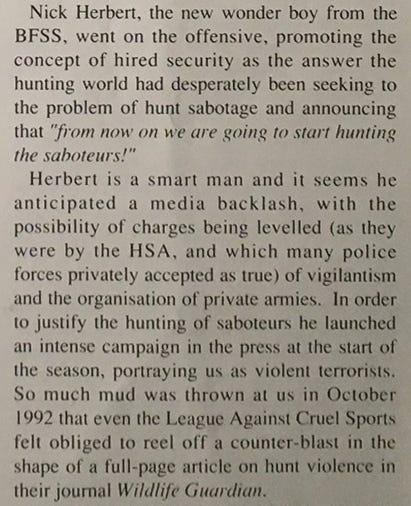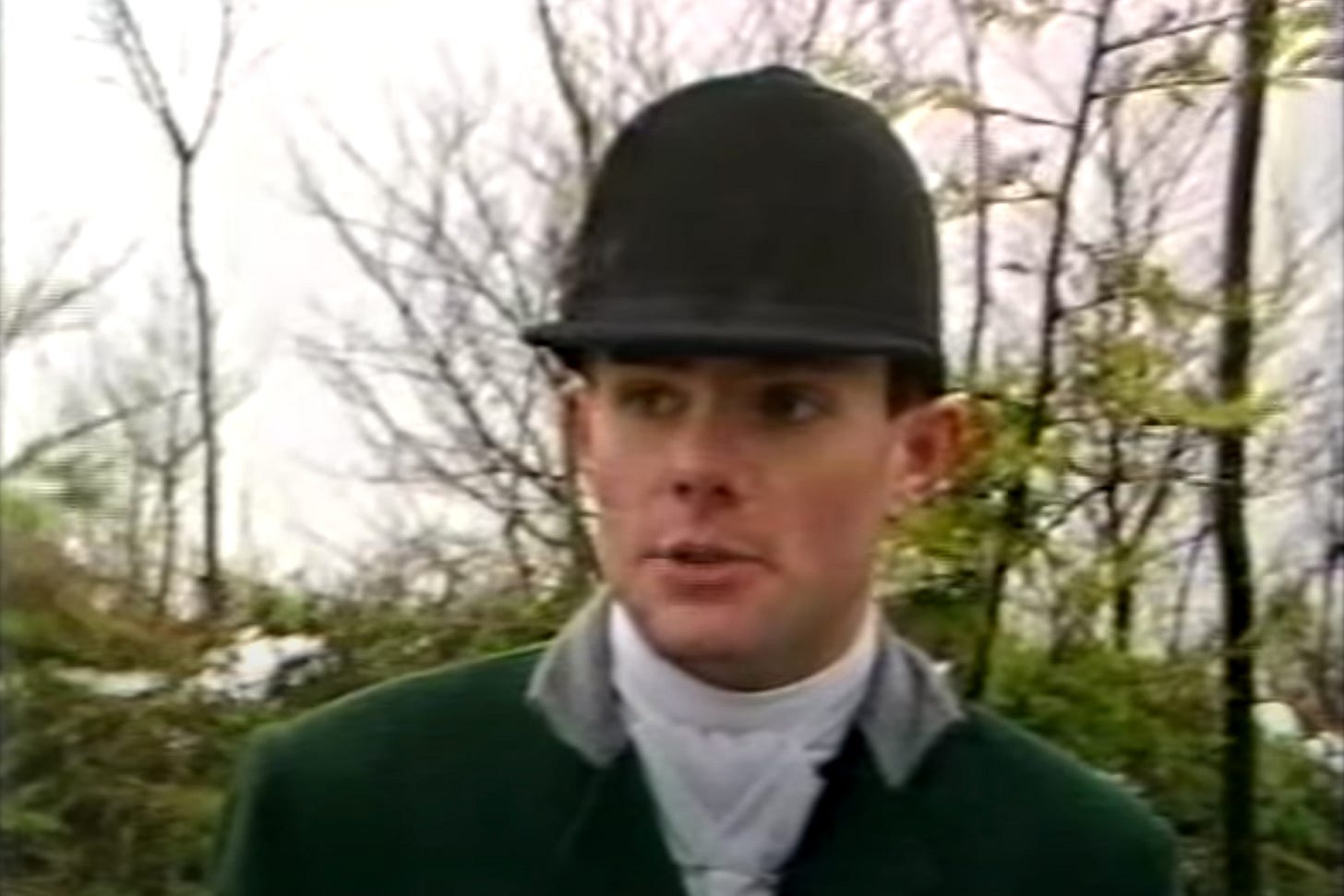Nick Herbert: From ‘architect’ of hunt stewards to the top of the College of Policing
“Hunting is still in my blood”
On the 14th January 2021 Nicholas Le Quesne Herbert (Lord Herbert of South Downs) was appointed chair of College of Policing. This position has caused concern on social media due to his historic involvement in bloodsports. These concerns aren’t unfounded as he continues as an outspoken advocate of hunting and shooting and, even though his Wikipedia page doesn’t mention his active participation in hunting, he doesn’t shy away from his history in bloodsports. It would be difficult to, as most of his life has revolved around it in one form or another.
Sporting red and green jackets
In an interview with rural issues and bloodsports magazine The Field he states he grew up surrounded by hunting, followed the Cambridgeshire Harriers and later became an amateur whip for the Essex Foxhounds. While studying in Cambridge, he was joint master of the university pack of hounds the Trinity Foot Beagles between 1984 and 1985.
After leaving university he formed the Newmarket Beagles in 1987 and was featured in BBC’s Hunting & Hunt Saboteurs, which aired in 1989. Herbert, who was huntsman and joint master at the time, stated:
We’ll never grow out of hunting. It is something that will stay with us for the rest of our lives. It is an addiction.
The following year, Herbert was appointed director of public affairs for the British Field Sports Society and remained in this position for six years. He described himself as a contributor to the Countryside Movement, which later became the foundations for the Countryside Alliance (CA).
While in this position, he also took a hands-on approach. In the Spring 1992 issue of the Hunt Saboteurs Association’s (HSA) publication Howl, links are made between the use of hired stewards against saboteurs and the British Field Sports Society. It is alleged that Herbert was the “wonder boy” behind this form of private policing. The HSA recently echoed this claim in an online article.

Mike Huskisson, in his book Outfoxed Again, recalls similar claims. He states that Herbert was involved with organising hunt stewards at an early morning cub-hunting meet of the Essex Foxhounds in October 1992 and that he was told that Herbert was the “architect of the hunt stewarding idea”. The role of hunt stewards was (and still is) to remove saboteurs, usually by using violence or intimidation.
According to Animal Cruelty Investigation Group and the Animal Welfare Information Service (ACIGAWIS), the Newmarket Beagles are likely to have disbanded in the late 1990’s as the hunt weren’t listed in the 1999-2000 Bailey’s Hunting Directory. Herbert claims he had the hounds for 14 seasons.
Politics
For a short period, Herbert’s focus steered away from hunting. In 1997 he unsuccessfully stood as the Conservative candidate for Berwick-upon-Tweed in the 1997 election. A year later, he became chief executive for Business for Sterling, which helped launch the campaign against the Euro. In 2001, public services think tank Reform made him its director.
In 2005, he stood as Conservative candidate for Arundel and South Downs and was successful. Herbert soon reaffirmed his position on hunting by stating that the Hunting Act 2004 had “no merits” and was “devastating on the natural rural communities that have existed for hundreds of years in that part of the world and which bind rural people together”. He would later, in 2009, describe the legislation as an “ass” and an “act of spite”.
In this same year, he announced his commitment to overturning the hunting ban as part of the Conservative manifesto in front of an audience at the Festival of Hunting. This was featured a week later in Horse & Hound magazine. The same day this was published, Herbert received donations mounting up to £24,500 - £5,500 of which was directly connected to hunting and shooting.
His largest hunting donor, however, was Johan Christofferson, who was joint master of Scotland’s first prosecuted hunt the Jedforest Hunt between 2008 and 2014. Herbert received a total of £23,500 between 2009 and 2015.
In 2019 Herbert was appointed chairman of the CA. In a statement, he said he was “honoured”. His focus on this new position was part of his decision to resign as an MP, after serving for 14 years.
During his time as an MP, Herbert was shadow minister for police reform from 2005 to 2007, shadow secretary of state for justice between 2007 and 2009, shadow secretary of state for environment, food and rural affairs from 2009 to 2010 as well as minister of state for policing and criminal justice between May 2010 to September 2012.
His newfound position in the CA was widely praised. In 2020, Horse & Hound described Herbert of having “direct knowledge of the nitty gritty of hunting” and that his experience “gives weight to his appointment to the Alliance chairmanship”. Herbert continues by stating that hunting is “still in my blood and I could acquire the bug again very quickly.” Later that year, Herbert echoed a dated narrative that the “threats” to shooting and hunting were an attack on “the rural way of life”.
On the 27th January 2021, minutes from a 2019 committee meeting of the Masters of Foxhounds Association (MFHA) were leaked. Hunting Leaks claim this shows evidence that the CA and the Hunting Office conspire to spy on saboteurs, which they state is unlawful under GDPR legislation. The document suggests that Herbert, acting as chair for the CA, was present.
Hunting, sabbing and the law
The dynamic between the police and hunt saboteurs has always been rocky at best. Police powers, for a time, were limited and basic in responding to saboteurs. The introduction of the Public Order Act 1986 changed that and complicated hunt sabotage. For years this legislation was used as means of regularly arresting saboteurs, though the majority of cases were evidently dropped and many of those that were charged successfully overturned the verdict in appeals.
The passing of the Criminal Justice & Public Order Act 1994 caused further complications; granting powers that attempted to criminalise elements within direct action, including hunt sabotage, under the terms of ‘aggravated trespass’. According to former police officer Kevin Morris, this legislation was “rushed through” by the Conservative party due to “pressure from land owners and hunts”. In an HSA report that reviews the use of these new powers in the first season following the passing of the legislation, it reveals that convictions, albeit a small amount, were made against saboteurs. Though this suggests a failure to successfully prosecute saboteurs, it does prove the legislation to be an effective tactic on arresting saboteurs on the day.
The Hunting Act 2004 has now shifted the policing of hunting; it not only focuses on the actions of those who oppose bloodsports, but also those who participate in it. Criticism of the legislation is shared of both sides, where some call for it to be strengthened while others campaign to repeal the act altogether. Tim Bonner, of the CA, makes the bold claim that “the hunting act has failed; it is difficult now to find a single person who would defend this piece of legislation which has achieved nothing for animal welfare”. This is only plausible if you ignore the fact that there have been 497 successful prosecutions under this legislation between 2005 and 2018, though most of these are related to poaching and hare coursing. The most recent prosecution of a hunt was the Meynell & South Staffordshire Hunt.
In September 2020, the HSA leaked an online webinar organised by the Hunting Office, hunting’s governing body, in which trail hunting was described as a “smokescreen”. Mark Hankinson, MFHA director and Hunting Office executive director, stated;
If we are going to get any support from the Police…if you haven't got any viable trail evidence how an earth are we going to refute these allegations.
Though wildlife would greatly benefit from the strengthening of the Hunting Act, a major issue is with the intention of police and the Crime Prosecution Service. Former police chief Martin Sims, who is director of investigations for the League Against Cruel Sports, shared this concern as he believes that hunting continues with impunity and that the police and courts fail to hold hunts accountable.
Not ‘gone away’
In his new position as chair of the College of Policing, it is clear that Herbert has no intention of enforcing the Hunting Act. The purpose of the College of Policing, according to its website, is to “provide those working in policing with the skills and knowledge necessary to prevent crime”. As he remains chair of the CA, who are effectively a pro-hunt lobbying group, it is safe to assume that the College of Policing providing skills and knowledge to prevent wildlife crime is not high on their priority list.
Though Herbert’s position will not have a direct effect on prosecutions, it is reasonable to believe that he won’t make them any easier. Commenting on their Code of Ethics, the College of Policing states that “having a Code of Ethics is not enough to reduce unprofessional behaviour” and that “if the public don’t have the confidence to trust the police to be fair, acting ethically and in their best interests, they are less likely to assist the police in upholding the law”. Indeed, this lack of trust is why hunt saboteurs continue to take direct action to disrupt bloodsports.
-
Want to support The Citro? Click here to contribute.
-
Headline image via YouTube

